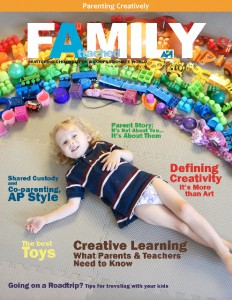The other morning, when we were already late for school, I found my two young boys using cans of foam soap to cover the bathroom in snow scenes. As one son stabbed a foam snowman in the face with a giant carrot, I surveyed the mess and thought, “This is good material.” Instead of blowing up, I wrote it down. It was even funnier on paper!
Lisa Lord lives near Dublin, Ireland, with her husband and two children, where she works as an editor for Firecrest Clinical. She serves as Assistant Publications Coordinator for Attachment Parenting International (API).
Though you may not read about it in many parenting books, writing can be a powerful and dependable tool for any parent, even if you don’t feel all that writing-inclined. It is a good fit for API’s Eighth Principle of Parenting: Strive for Balance in Personal and Family Life, though it could be argued that it has as much of a place within API’s Third Principle of Parenting: Respond with Sensitivity in that writing can help parents problem-solve and unlock solutions to child-rearing challenges.
Parenting is emotional work that requires flexibility and creativity. Writing can help us acknowledge and understand our emotions and lead us to creative solutions to problems. Writing allows us to slow down and notice life as it unfolds, moment by moment. Writing allows us to record our individual journey through parenthood and capture the moments that will fade from memory. Writing is a two-way street: It is a creative outlet at the same time that it clears a path for creativity to flow inward.
Writing has become a lifeline for me as I navigate my way through parenting. Journal writing is a comforting and enjoyable semi-daily ritual that I’m happy to rise early for. In challenging times, writing is also a critical source of wisdom and support. I recently stewed in anger for hours after a minor argument with my husband. Five minutes of writing uncovered that the problem was not my husband at all; it was my unwillingness to set a boundary for myself, a discovery that melted my anger and infused me with compassion for both of us. Since I tend to take life too seriously and overreact when stressed, writing helps me keep perspective in moments of exasperation.
Why Writing Works
Freelance writer and veteran blogger Abigail Green of Abby Off the Record says that writing is an important source of self-reflection: “I truly relate to the sentiment shared by E.M. Forster: ‘How do I know what I think until I see what I say?’ Writing helps me process things.”
There is plenty of science to support this perspective. The key factor is creating a narrative about emotional life events, as Daniel Siegel, MD, and Tina Payne Bryson, PhD, explain in their 2011 book, The Whole-Brain Child: “This is what storytelling does: it allows us to understand ourselves and our world by using both our left and right hemispheres together. To tell a story that makes sense, the left brain must put things in order using words and logic. The right brain contributes the bodily sensations, raw emotions and personal memories, so we can see the whole picture and communicate our experience.”
James Pennebaker, PhD, is one of the most well-known researchers on the benefits of expressive writing. In an article he co-authored with Janel D. Seagal, PhD, “Forming a Story: The Health Benefits of Narrative,” the authors explain how writing narratives about emotionally difficult experiences can improve mental health: “Constructing stories facilitates a sense of resolution, which results in less rumination and eventually allows disturbing images to subside gradually from conscious thought. Painful events that are not structured into a narrative format may contribute to the continued experience of negative thoughts and feelings.”
Writing can benefit more than just mental health. As summarized by Karen A. Baikie and Kay Wilhelm in their article “Emotional and Physical Health Benefits of Expressive Writing,” research by Pennebaker and others shows that expressive writing can lead to:
- improved immune system function
- decreased blood pressure
- improved organ function
- a feeling of greater psychological well-being
- improved mood and emotions
- better working memory.
Expressive Writing
Pennebaker, a social psychologist at the University of Texas, USA, offers some general guidelines about expressive writing, though he also encourages people to modify the instructions to suit their needs:
- Write continuously for a minimum of 15 minutes on 3 to 4 consecutive days.
- Write about something you have been worrying about, avoiding or feel is affecting your life in an unhealthy way.
- Let go, fully admit and explore your feelings in your writing. Write with the intention that no one else will ever see your writing, which will allow you to be more open and honest.
Pennebaker says that many people feel more negative or emotionally raw immediately after writing, but these feelings generally resolve after a few hours.
That said, some people may benefit from therapy to work through painful past events. Writing is not a substitute for necessary therapeutic intervention.
Pennebaker and colleagues developed a computer analysis program to identify types of word usage in subjects’ writing. The greatest physical and emotional benefits are attained when people use a high rate of positive words, a moderate amount of negative words (as opposed to a high or low amount) and an increasing number of insight and causal words (such as understand, realize, because, reason).
Beyond the expressive writing studies, writing in other genres, such as personal essays, poetry and fiction, has also been shown to impart psychological and emotional benefits. The purpose of this article is to explore the benefits of writing about one’s own parenting journey.
It follows that creating coherent narratives about childhood wounds, painful past events or current problems may help parents respond more sensitively, constructively and creatively to their children. Mothers may find it particularly therapeutic and empowering to revision difficult birth experiences through their writing.
API provides guidance to mothers (and fathers) exploring their emotions surrounding their childbirth experiences, as they write their birth stories for publication or personal use. Review API’s Birth Story Guidelines as well as articles like “Heal Thyself Through Birth Storytelling” and “The Importance of Sharing Birth Stories” on API’s The Attached Family.
Expressive writing can be done sporadically as needed, or it can be worked into a regular writing practice. Profiled below are 3 noteworthy practices that have helped many parents tap into the creative power of writing:
1) Morning Pages
Author and creativity teacher Julia Cameron urges all of her readers and students to write what she calls Morning Pages: 3 pages of writing done by hand upon waking about any topic whatsoever. In her 1998 book, The Right to Write, Cameron explains: “At root, Morning Pages are profoundly helpful. They calm us down. They cheer us up. They console us. They inspire us. Morning Pages are for Westerners a uniquely potent form of meditation. They allow us to empty our minds and hearts of disturbing distractions and simultaneously open our minds and hearts to deeper reflections.”
Read more tips from Julia Cameron in this API interview, also included in this “Inspired Parents” issue of The Attached Family.
In her latest book, published in 2013, The Artist’s Way for Parents, Cameron recommends Morning Pages as the bedrock creativity practice for parents. Since the pages are not meant to be shared, parents can use them to openly examine the myriad and sometimes troublesome emotions that come with parenting, emotions many parents may find it hard to accept in themselves or share with others. This then frees parents to be more present to their lives and their children.
For parents who feel they don’t have the time for morning writing, Cameron suggests doing as much as possible first thing in the morning, even if it’s only for a few minutes, then finishing the pages as time permits throughout the day.
2) The Mother’s Notebook
In her 2008 book, Writing Motherhood, and followup courses, writing instructor Lisa Garrigues explains how to keep a Mother’s Notebook. Though Garrigues’s work is focused on motherhood, the principles and practices of the Mother’s Notebook can easily be extended to fathers or other caregivers.
The basic practice is to write every day for 2 pages or about 15 minutes. Each day’s writing is based on a topic, which Garrigues calls a “writing start,” although she also encourages her students to use their notebook for whatever calls to them, from recording moments in their family life to planning birthday parties to sorting through major life traumas. Garrigues explains: “I like to think of the Mother’s Notebook as a big sister to the diary or journal. In the pages of our Mother’s Notebook, we tell our stories at the same time that we hone our craft. The goal is to make our way as writers and mothers.”
Garrigues has been teaching her program for many years and has witnessed how writing can bring creativity and inspiration to parenting: “Mothers often arrive in my classes feeling physically exhausted and emotionally spent—in some cases ‘brain dead,’ their imagination and creativity anesthetized by the rigors and routines of daily life. In just 8 weeks of writing, they discover that motherhood does not have to be an impediment to creativity. On the contrary, it can be a limitless source for story—a mother lode, if you will. Again and again, my readers tell me that the moment they open their Mother’s Notebook, they notice a physiological change: Their hearts settle, their pulses regulate, their breath steadies. They grow calm and clear. As they continue to write, they gain insight into their children’s behavior, and they better monitor their own. Eventually, they see solutions where before they saw none. In this way, writing is much more than a tool for documenting our lives. It is a path for navigating the rocky ridges and lush valleys of motherhood.”
Garrigues has been keeping Mother’s Notebooks for over 25 years and has seen firsthand the benefits of a regular writing practice: “Every seed of my creative life was planted in the pages of a notebook. Every article I have written, every class I have taught, every talk I have given, my first book and now my second—all started in my Mother’s Notebook.”
3) The One-Sentence Journal
Author Gretchen Rubin offers a handy solution to those who want to write but are not able to commit much time to the practice. The name says it all: The One-Sentence Journal is a journal in which you write down only one sentence, or a few, from your day. It doesn’t take much time, and by the end of a year, you will have captured 365 moments in your family’s life.
With children around, there are many of those moments, and they could be easily forgotten, like the time I asked my 3-year-old what he wanted in his lunchbox, and he answered after some thought, “A kiwi and a bunny rabbit!”
Writing and Parenthood in Action
Professional writers Abigail Green and Amy Wright Glenn share how motherhood and writing intersect and complement each other.
Green, who writes articles and essays in addition to writing for clients, has been blogging steadily for 8 years: “Blogging heightens my sense of being in the moment, because I’m noticing and recording events that I otherwise may not have paid much attention to. I think the practice of noticing things and shaping day-to-day events into a narrative definitely makes me a more creative parent. If my son is struggling with a homework assignment, I might suggest a few different ideas of how he could approach the assignment, just as I would when considering how to approach an essay or writing assignment myself.”
Just as writing can lead to creativity in parenting, parenting can also be a source of inspiration in writing. Says Glenn: “Some of my very best ideas—including titles for articles or even fully formed sentences—come to me when nursing my son down to sleep. So, there is a well of creative energy that opens in mothering. Occasionally, after meditating, I’ll find that poems come through me. How does writing a poem impact the way I respond to my husband and son? Well, it gives me pause and helps me remember how truly precious each moment, each breath, each day is. In this sense, meditation and writing are both wake up calls for living as authentically and clearly as possible.”
Both Glenn and Green attest to the restorative effect of writing on their parenting and overall mental health. Glenn explains: “I am an avid journaler. Writing has been and continues to be very therapeutic for me. I really find that I can dive into the true beauty and pain of my life in personal writing that is for my eyes only. And I have at times drawn from these writings to compose certain pieces that I choose to share.”
And Green shares: “I feel like the personal writing I do, on my blog or in my essays, is crucial for my happiness. I’m someone who requires a creative outlet, some form of self-expression, and a tangible result in order to thrive. Those times when I feel like Sisyphus pushing a mountain of dirty laundry up a hill day after day, I can look at my writing and think, ‘There. There’s proof that I’ve actually accomplished something.’ The impact it has on my parenting is that it makes me a happier mom.”
How to Make Writing a Habit
No matter the method used, writing requires a parent’s most precious resource: time. Some parents may feel they just don’t have a minute to spare. But writing can quickly become a self-sustaining habit: Once you get started, you may wonder how you could live without it.
Gretchen Rubin, who is finishing a 2015 book about habits, Better than Before, says that doing something every day is often easier than doing it less frequently. Once writing becomes part of your daily routine, you won’t have to think about the how, when and why.
She adds that that putting something on the schedule, especially first thing in the morning, means you will be more likely to follow through.
However, Garrigues reminds us to take advantage of the pockets of time we may find throughout the day: sitting in the carpool line or during public transportation commutes, waiting for an appointment, during a lunch break at work, while the kids are occupied with homework or friends, while the baby naps and so on. Carrying your notebook wherever you go makes it possible for you to take advantage of these moments.
The wonderful thing about writing is that even if it takes a long time for a solid writing habit to be established—and no matter how many times it’s interrupted—it’s always possible to pick up your story right where you are.
From Personal to Published Writing
Many people want to take their writing in a creative direction and possibly share it with the larger world. Beyond the expressive writing studies, writing in other genres, such as personal essays, poetry and fiction, has also been shown to impart psychological and emotional benefits. For example, a 2012 study highlighted in API’s Journal of Attachment Parenting suggests that blogging is associated with feelings of connectedness and well-being for new mothers.
Whether writers choose to craft fictional characters for stories and novels, to spin tales about their own lives, or to research and write articles about their favorite topics, there are countless possibilities for writing in the public sphere. How-to books and classes, online or in person, are available for every type of writing and level of experience. In addition, writing groups can be a wellspring of guidance and support for both new and veteran writers.
The Inner Critic: A Writer’s Nemesis
One question that plagues even the best writers is, “Am I good enough?” Many writers, perhaps most, have an active inner voice that constantly criticizes their writing. The best way to combat this critic is to ignore it and keep writing regularly—and quickly. Many writing teachers tell students to keep the pen (or fingers on the keyboard) moving, especially when working on a first draft or their own personal writing.
Lisa Garrigues offers this advice in Writing Motherhood: “Forget the rules. Rules encourage us to think of writing as correct or incorrect, right or wrong, good or bad. When you write your Mother Pages, forget about punctuation, grammar, spelling, accuracy, logic. You can do the housekeeping later. For now, just write.”
Cameron says that perfectionism is the biggest creativity block she encounters. One reason is that writers may try to both communicate with people and impress them. She suggests a shift in perspective: Writers should try to listen to what wants to be communicated through them. She explains in The Right Way to Write: “When writing is rooted in the process of taking down the next thought as it unfolds itself to us, then it is less about our brilliance and more about our accuracy.”
Keep in mind that the polished gems you pick up in the book store or read in your favorite online publication probably didn’t start out so perfect. Most published writers work with editors who point out problems in spelling, punctuation, grammar and usage, and guide the writer in clarifying the message and fine-tuning the words for maximum impact on the reader.
If you are an aspiring or experienced writer who feels passionate about Attachment Parenting (AP), we encourage you to consider writing for API. Whether you are a professional looking to share your knowledge, a writer interested in researching a topic that fascinates you or a parent wanting to share your unique perspective about how AP has touched your life, your idea may be a perfect fit for one of API’s publications.
The API Publications team works with writers of all levels of experience in providing developmental editing and compassionate coaching to help them improve their writing to become better advocates for AP.
API accepts original, unpublished articles and personal narratives related to the API’s Eight Principles of Parenting and following API’s Writer Guidelines on an ongoing basis.



